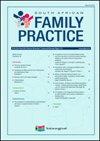Investigating causes of the high prevalence of sexually transmitted infections in Du Noon
IF 1.2
Q2 MEDICINE, GENERAL & INTERNAL
引用次数: 0
Abstract
Background: In South Africa, sexually transmitted infections (STIs) represent a significant public health issue. Sexually transmitted infections contribute significantly to the burden of disease in South Africa and are recognised as one of the main causes of the human immunodeficiency virus (HIV) epidemic. The aim of this study was to investigate the potential causes of the high prevalence of STIs in the Du Noon population.Methods: A mixed methodology study involving 40 participants between the ages of 18 years and 45 years was conducted at Du Noon community health centre from 01 May 2021 to 15 May 2021. Both structured questionnaires and one-on-one patient interviews with open-ended questions were utilised to collect data.Results: Cultural beliefs, having multiple partners, a lack of partner notification, alcohol consumption, and a lack of condom usage were found to be the main contributing factors to the high incidence of STIs. Sex education appears to be lacking. Our findings reflected the other well-known cultural and socioeconomic issues confronting South African communities, for example, poverty, age-disparate relationships, and polygamous relationships.Conclusion: The cultural perspectives and understandings of sexual interactions of older men appear to have an impact on younger generations; as do peer pressure, social media and other socio-economic factors. There is an urgent need to shift cultural ideologies and norms among the youth. More research is needed to understand the views and misconceptions of the general public about STIs.Contribution: This study highlighted how health education challenges, interpersonal relationships, and socioeconomic barriers are still important factors in STI transmission.调查杜努恩性传播感染高发的原因
背景:在南非,性传播感染(STI)是一个重大的公共卫生问题。性传播感染大大加重了南非的疾病负担,并被认为是人类免疫缺陷病毒(HIV)流行的主要原因之一。本研究的目的是调查杜努恩人口中性传播感染高发的潜在原因:2021 年 5 月 1 日至 2021 年 5 月 15 日,在杜农社区卫生中心开展了一项混合方法研究,共有 40 名年龄在 18 岁至 45 岁之间的参与者参加。研究采用结构化问卷和一对一开放式问题患者访谈两种方法收集数据:结果发现,文化观念、有多个性伴侣、不通知性伴侣、饮酒和不使用安全套是导致性传播疾病高发的主要因素。性教育似乎很缺乏。我们的研究结果反映了南非社区所面临的其他众所周知的文化和社会经济问题,如贫困、年龄差异关系和一夫多妻制关系:结论:老年男性对性互动的文化观点和理解似乎会对年轻一代产生影响;同辈压力、社交媒体和其他社会经济因素也是如此。迫切需要转变年轻人的文化意识形态和规范。需要开展更多研究,以了解公众对性传播感染的看法和误解:本研究强调了健康教育挑战、人际关系和社会经济障碍仍是性传播疾病传播的重要因素。
本文章由计算机程序翻译,如有差异,请以英文原文为准。
求助全文
约1分钟内获得全文
求助全文
来源期刊

South African Family Practice
MEDICINE, GENERAL & INTERNAL-
CiteScore
1.50
自引率
20.00%
发文量
79
审稿时长
25 weeks
期刊介绍:
South African Family Practice (SAFP) is a peer-reviewed scientific journal, which strives to provide primary care physicians and researchers with a broad range of scholarly work in the disciplines of Family Medicine, Primary Health Care, Rural Medicine, District Health and other related fields. SAFP publishes original research, clinical reviews, and pertinent commentary that advance the knowledge base of these disciplines. The content of SAFP is designed to reflect and support further development of the broad basis of these disciplines through original research and critical review of evidence in important clinical areas; as well as to provide practitioners with continuing professional development material.
 求助内容:
求助内容: 应助结果提醒方式:
应助结果提醒方式:


